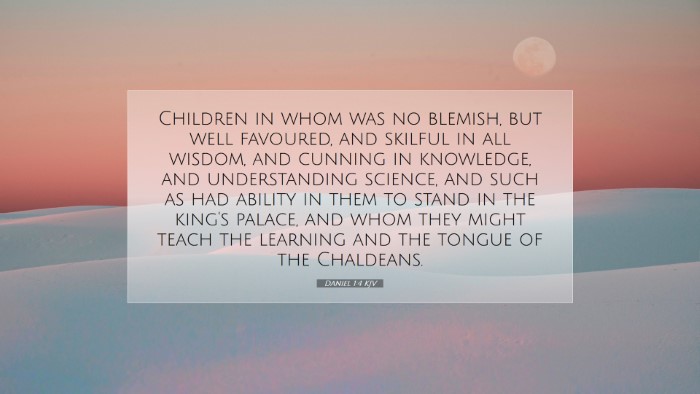Old Testament
Genesis Exodus Leviticus Numbers Deuteronomy Joshua Judges Ruth 1 Samuel 2 Samuel 1 Kings 2 Kings 1 Chronicles 2 Chronicles Ezra Nehemiah Esther Job Psalms Proverbs Ecclesiastes Song of Solomon Isaiah Jeremiah Lamentations Ezekiel Daniel Hosea Joel Amos Obadiah Jonah Micah Nahum Habakkuk Zephaniah Haggai Zechariah MalachiDaniel 1:4
Daniel 1:4 KJV
Children in whom was no blemish, but well favoured, and skilful in all wisdom, and cunning in knowledge, and understanding science, and such as had ability in them to stand in the king's palace, and whom they might teach the learning and the tongue of the Chaldeans.
Daniel 1:4 Bible Commentary
Commentary on Daniel 1:4
Verse: "Children in whom was no blemish, but well favoured, and skilful in all wisdom, and cunning in knowledge, and understanding science, and such as had ability in them to stand in the king's palace, and whom they might teach the learning and the tongue of the Chaldeans."
Contextual Overview
The narrative in Daniel opens amid the tumult of the Babylonian captivity. Daniel 1:4 introduces us to the criteria set by King Nebuchadnezzar for selecting young men to serve in his court. This verse is pivotal as it highlights the qualities that Babylon valued in the youth it sought to assimilate.
Criteria for Selection
This verse outlines several qualities for the youth chosen to serve the king:
- No blemish: This indicates physical attractiveness and health, suggesting a focus on outward appearance as a valuable trait in service to the king.
- Well favoured: This implies a certain charm or demeanor, possibly referring to an appealing personality that could gain favor in royal courts.
- Skilful in all wisdom: This speaks to intellectual capability and discernment; these young men were to possess keen judgment and understanding.
- Cunning in knowledge: Indicates a proficiency in various fields of knowledge, which would have included literature, science, and perhaps the arts.
- Understanding science: This suggests not only the theoretical aspects of knowledge but also a practical application of what they learned.
- Ability to stand in the king's palace: This points towards not just intelligence, but also an understanding of court etiquette and the nuances of royal protocols.
- Capability to learn the Chaldean language: This reflects the importance of language and communication in a foreign culture, emphasizing the necessity for cultural adaptation.
Theological Insights
Daniel's selection as a youth serving in Nebuchadnezzar's court is symbolic not just of personal attributes, but it also represents the challenge faced by Israel in a foreign land. The characteristics emphasized in this verse lay a foundation for examining the spiritual ramifications of living in a culture that opposes Yahweh.
Role of God in the Selection
As noted by Matthew Henry, while human standards often govern selection, God's sovereign hand is evident in the lives of chosen individuals. The narrative indicates that despite their youth and vulnerable situation, the Lord had a purpose for these young men, establishing the principle that He often selects the apparently weak or unassuming for significant roles.
Cultural Assimilation and the Challenge of Conformity
Albert Barnes underscores the difficulty of cultural assimilation. The chosen youths were not merely being prepared for service; they were being indoctrinated into a new way of thinking that contrasted sharply with their Jewish heritage. This presents a theological challenge regarding the balance between engagement with the world and the preservation of one's identity in Christ.
Practical Application
This verse calls on leaders and educators within the church to consider what qualities are prioritized in forming the next generation of spiritual leaders. The quality of mind, character, and morals should be of utmost importance, mirroring the characteristics outlined in the biblical text.
Encouragement for Leaders
For pastors and church leaders, the qualities highlighted in Daniel 1:4 serve as a reminder that the selection and training of leaders should not focus solely on external appearances or intellect. Rather, there must be a holistic approach that values spiritual depth, character integrity, and a passion for God’s mission.
Inspiring Students and Theologians
The verse also provides encouragement to students and young theologians called to serve in various cultural contexts. They are reminded that their preparation should encompass both a solid grounding in faith and an excellent grasp of knowledge, embodying the dual calling to be salt and light in the world.
Conclusion
In summary, Daniel 1:4 offers rich insight into God's providential control over the choices made by those in power and the expectations placed upon His people in challenging circumstances. The qualities described highlight the importance of both character and competence in serving a higher purpose. This verse invites a deeper reflection on how believers integrate their faith within a broader cultural framework while maintaining fidelity to their foundational beliefs.


